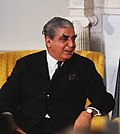This article includes a list of general references, but it lacks sufficient corresponding inline citations .(September 2024) |
The office of the chief martial law administrator (CMLA) was a senior and authoritative post created in countries such as Pakistan, Bangladesh and Indonesia that gave considerable executive authority and powers to the holder of the post to enforce martial law in the country in events to ensure the continuity of government. This office has been used mostly by military officers staging a coup d'état . On some occasions, the office has been under a civilian head of state.






